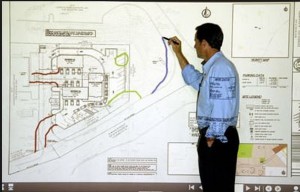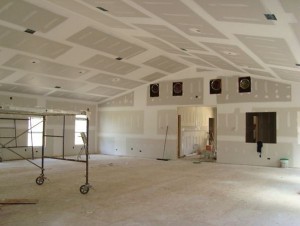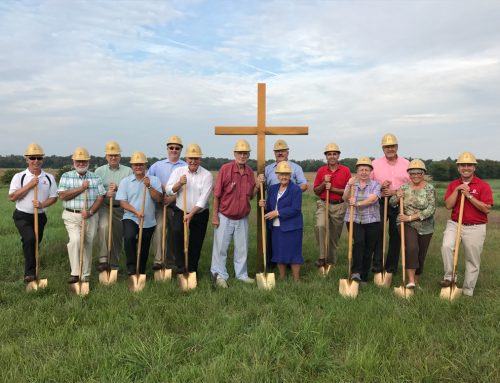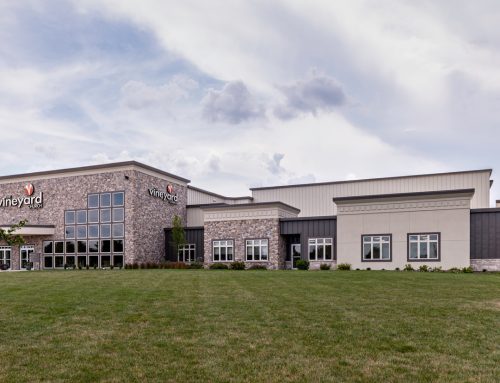All pastors are builders, but not all pastors are builders of buildings.
Pastors build community, build wisdom and knowledge, build relationships, build the Kingdom, and so much more. And most pastors go into ministry with these types of building skills.

Not all pastors know how to build a church building. What do they do when their building is bursting at the seams with growth and there’s an obvious need for a new facility? Where do they find an objective party to help guide the way? It would be nice if pastors had someone within the congregation, or a deacon or elder, who understood the process, but not all churches have someone to fit the bill.
 Eric Koehler found himself in that type of situation. Koehler had been on staff at a local church where he became friends with DJ’s CEO Bob Schrock. Eric eventually obtained a position as the lead pastor of ValleyPoint Church, a nondenominational church in Glenn Mills, Pennsylvania. The church was meeting in a school and growing very fast. Within just a couple of years, the pastor realized a new building was in order.
Eric Koehler found himself in that type of situation. Koehler had been on staff at a local church where he became friends with DJ’s CEO Bob Schrock. Eric eventually obtained a position as the lead pastor of ValleyPoint Church, a nondenominational church in Glenn Mills, Pennsylvania. The church was meeting in a school and growing very fast. Within just a couple of years, the pastor realized a new building was in order.
Koehler also saw the need for a trusted companion to help along the journey, so he called on Schrock. Said Koehler, “For me, building is a confusing thing. It’s complicated, especially for those who don’t live in that world. One builder says this, one architect says that. The process just got cloudy, so I thought, ‘I need to talk to Bob.’”
Together, Koehler and Schrock put a plan of action together that included questions to ask potential builders. This plan of action can be used for any church leader – pastor, elder, or building chairperson – to help guide the construction process.
Plan of Action:
1. Determine desired method of construction delivery.
2. Request for qualification (RFQ).
3. Schedule live interviews.
4. Create a score sheet.
5. Finalize your decision.

Determine Desired Method of Construction Delivery
While it may seem there are many ways to approach a construction process, essentially there are three:
• Design Build
• Partnering
• Competitively Bid
To read what each of these approaches entails, click here. In this case, ValleyPoint determined that Design Build was their preferred method.
Request for Qualification (RFQ)
A RFQ, or Request for Qualifications, is a request from your church to local contractors to send a letter explaining their qualifications.
“Obviously, you want to choose the right builder for your church because that builder becomes a partner and friend,” explained Schrock. “Your builder should not only have the competence and experience, he also should have a clear understanding of what the church stands for and what its vision is.”
Schrock offers the following examples of RFQ, which should be modified by you to fit your specific church project:
A. Company Information
–How long has your company been in business, and how long have you been delivering church structures?
–Give a reference list of similar facilities you have built.
–How large is your staff and how are they organized?
–Please include a balance sheet for your company.
B. Organizational Systems
Describe your organization’s systems for the following tasks:
–Developing preliminary and final design
–Developing project costs
–Developing and tracking project schedules
–In your DesignBuild process, what constitutes a change order?
–Managing the site and documenting construction progress
–Job site safety procedures and systems
–Describe your fees/mark-up structure
–If the project is not built until (date), how much and when would we owe in the meantime?
C. Potential Team Members
Identify potential team members with their experience and background:
–Design team
–Preconstruction Representative
–Project Manager
–Field Superintendent
D. Other Questions
–Which trades will you self-perform and why? Do you anticipate a union or open-shop jobsite?
–Describe your confidence that this project can be delivered for the mentioned total project price (assuming a budget was provided).
Schrock recommends having the prospective builders answer the questions and return via e mail or postal service. At that point, the church can narrow its selection to three prospects for live interviews.
A second letter goes out, inviting the finalists to provide a presentation to the church selection committee. The committee also prepares the next, shorter, list of questions. Keep in mind your goal of discovering what the building process will look like if a certain builder is selected to partner with your church.
Schedule Live Interviews
This step is played out face-to-face between the church’s leaders and each potential builder. Sample questions include:
–How will you/we select the design entity/architect?
–Who (what individuals) will we be working with during design? Pre-construction? Construction?
–Who will be leading the process?
–What will our involvement be? Tell us your expectations for frequency and time of meetings.
–If you are selected, before design and pricing, how can we be confident that we are getting value and competitive pricing?
–Outline the steps and timeline you foresee based on a [church provides timeframe] campaign and a [church provides date] groundbreaking.
–Is there anything else you would like to elaborate on in your response to our earlier request for qualifications?
Create A Score Sheet

During a live interview, it’s always nice to have some sort of rubric or score sheet as a guide for the final decision-making process. The rubric, ideally, can be filled out during the presentation and questioning.
Schrock designed the below rubric, with the idea of scoring each answer 0-5, with 0 being poor and 5 being excellent.
Question (Score 0-5: 0 = poor; 5 = excellent) Builder A Builder B Builder C
|
Question |
Builder |
Builder |
Builder |
|
Familiarity with construction in the area? (Know the area; understand and able to deal with union vs. open shop; local building officials, subs) |
|
|
|
|
Completion & service thereafter? (Closeout process, as-builts; |
|
|
|
|
Schedule Accountability? (During pre-construction & construction) |
|
|
|
|
Site control? (Clean jobsite, safety of workers & visitors) |
|
|
|
|
Church experience? |
|
|
|
|
Does the company size fit the project? (Are they big enough? Are they too big? Will our project matter to them?) |
|
|
|
|
Comfortable with their DesignBuild processes? (Do they know how? Do I understand it? Who does the architect work for?) |
|
|
|
|
Selecting the right design partner(s)? How are they selected? Right experience? Will we get the creativity we want? Engineers, AVL, acoustics?) |
|
|
|
|
Competitive pricing? (Fees, OH, profit, general conditions; How do we know prices are competitive?) |
|
|
|
|
Cost accountability? (Maintain budget; will costs get away from us |
|
|
|
|
Are team members compatible with us? (Do I know who we’ll be working with? Can we work together? Will this be fun?) |
|
|
|
|
Trust? (Can I trust these guys? Do they share our values? Our |
|
|
|
With the rubric guiding the conversation, you can better discuss strengths and weaknesses of each firm. While you won’t want to rely solely on the numbers, the scores do provide a launching pad for the discussion.

Finalize Your Decision
After all the discussion, you’re ready to make a decision about which builder to go with. Again, having an outside source can help in this part as well, as an objective party has no strings attached to the project.
In Koehler’s case with ValleyPoint Church, two of the three firms tallied close scores on the rubric. The deciding factor was how one firm answered the questions about how they work with the architect.
Now, two years later, ValleyPoint is well into its building campaign. Said Koehler, “This process was totally worthwhile, and great success has come from it. We are very happy with the firm we have chosen. They have walked us through a vision discovery. They understand how we do ministry, what our dream is for our different ministry areas, and they have translated that into ministry space.”

When all is said and done, knowing what your ministry objectives are and how those objectives translate into a church building is your fundamental goal in finding the right builder. After all, you’re not just building a church – you’re building a future where faith happens for generations that follow.
If you like this article, you can find more like it by clicking here, scrolling down, and filling out the form for our e-newsletter.



You must be logged in to post a comment.